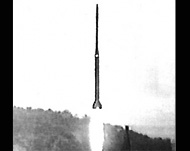Timeline: Nuclear negotiations
North Korea claims to have carried out its first nuclear weapons test, but Pyongyang has been using the threat of nuclear activity as a bargaining tool for years.

1993: North Korea threatens to quit the nuclear non-proliferation treaty.
1994: North Korea signs an agreement with the United States pledging to stop, and eventually dismantle, its nuclear weapons programme in exchange for help to build two nuclear reactors for energy production.
July 2000: North Korea threatens to restart its nuclear programme after delays to the two power plants.
June 2001: North Korea says it will reconsider its suspension of missile tests if Washington does not resumes talks intended at normalising relations between the two countries.
July 2001: US state department reports that North Korea is developing a long-range missile.
December 2001: George Bush, the US president, tells North Korea and Iraq that they will be “held accountable” if they develop weapons of mass destruction.
October 2002: The United States says Pyongyang has admitted running a secret uranium enrichment programme in violation of the 1994 agreement.
November 2002: The United States, Japan and South Korea halt oil supplies to North Korea which were promised under the 1994 deal.
 |
|
North Korea test-fired seven |
December 2002: North Korea refuses to open its nuclear facilities to inspection and asks the International Atomic Energy Agency to remove seals and surveillance equipment from its Yongbyon plant.
January 2003: Pyongyang says it has withdrawn form the nuclear non-proliferation treaty.
April 2003: North Korea claims it has nuclear weapons and may test, export or use them depending on US actions, Washington says.
August 2003: The first round of six-nation nuclear talks are held in Beijing, including China, the United States, Japan, Russia, and the two Koreas.
February 2004: Second round of six-nation talks.
June 2004: Third round of talks.
September 2004: North Korea refuses to attend the fourth round of talks accusing the US of “hostile” policies.
February 2005: North Korea announces it has nuclear weapons.
July 2005: Fourth round of six-nation talks eventually begins but ends in recess after 13 days with no agreement made.
September 15, 2005: A Macau-based bank is blacklisted by the US for alleged involvement in North Korea’s illegal financial activities. The bank responds by freezing North Korean assets.
September 19, 2005: Pyongyang offers to dismantle its nuclear programmes in exchange for energy assistance. The US agrees not to invade and to respect North Korea’s sovereignty.
November 2005: Fifth round of six-nation talks.
January 2006: North Korea says it will not return to talks unless the US lifts financial sanctions imposed because of its alleged currency counterfeiting and other illegal activities.
July 2006: North Korea launches seven missiles into the Sea of Japan, including a long-range Taepodong-2, drawing international condemnation and a UN security council resolution condemning it.
September 2006: North Korea rejects further talks on its nuclear programme, saying that Washington wants to rule the world.
October 2006: North Korea says it has conducted its first-nuclear weapons test.